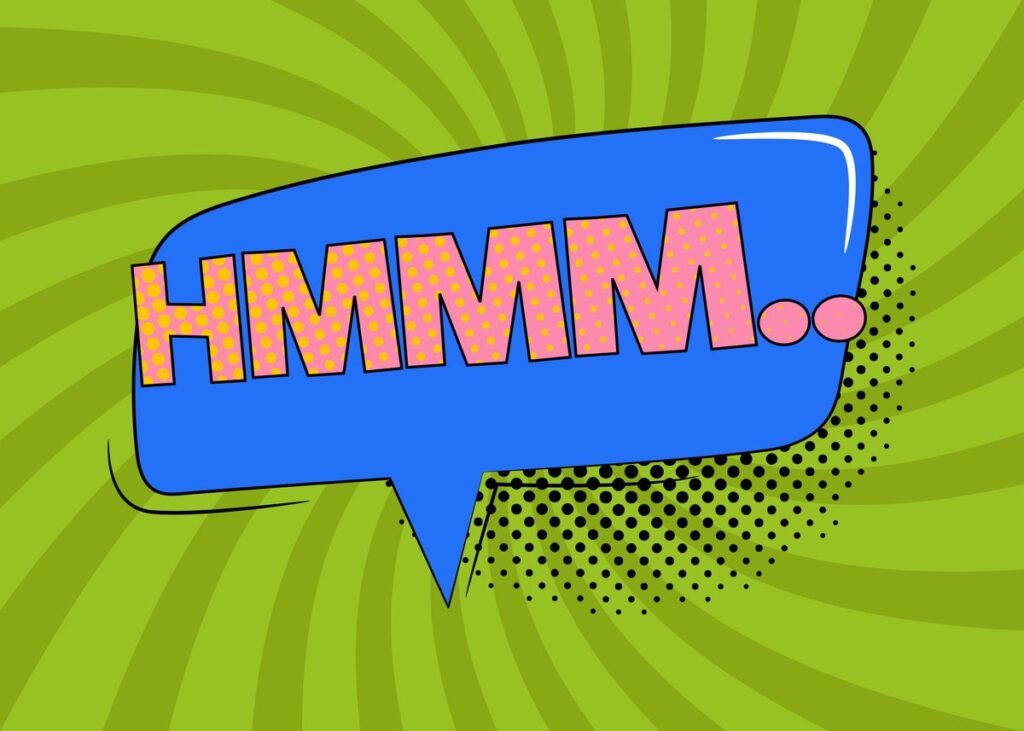Listen carefully to a spoken conversation and you'll notice that speakers use a lot of little Quasi-Words- mm-hmm, UM, Huh? And the like – that don't convey any information about the topic of the conversation itself. For many many decades, linguists Regarded Such uttenses as Largely irrelevant noise, the flotsam and jetsam that accumulate on the margins of language when speakers are available as articulate as theiri.
But these little words may be much more important than that. A less linguists now think that far from being detritus, they may be Crucial traffic signals to regulate the flow of conversation As well as tools to Negotiate Mutual Understanding. That puts them at the heart of language itself – and they may be the hardest part of language for artificial intelligence to master.
“Here is this phenomenon that lives right under nose, that we barely noticed,” Says Mark dingmanseA linguist at radboud university in the Netherlands, “That turns out to ups our ideas of what makes complex language even posesible in the first place.”
On supporting Science Journalism
If you're enjoying this article, consider supporting our Award-Winning Journalism by Subscribing. By Purchasing a subscription you are helping to ensure the future of important stories about the discoveries and ideas shaping our world today.
For most of the history of linguistics, scholars have tended to focus on written language, in large part beCause that what they had records of. But Once Recordings of Conversation Became Awailable, they could begin to analyze spokeen language The same way as written.
“If you want to have streamlined conversations, these are the tools you need.” —Mark Dingmanse, linguist
When they did, they observe that interjections – that is, short utterances of just a word or two that are not part of a larger sentence – WERE UbIquitous in EVITOUS SPEECH. “One in every seven utterences are one of these things,” Says DingeManse, Who Exploes the use of interjections in the 2024 Annual review of linguistics“You're going to find one of that little guys flying by every 12 seconds. Apparently, we need them. “
Many of these interjections serve to regulate the flow of conversation. “Think of it as a tool kit for conducting interactions,” Says Dingemanse. “If you want to have streamlined conversations, these are the tools you need.” An UM or UH From the speaker, for example, signals that they're about to pause, but aren Bollywood speaking. A Quick Huh? or What? From the listener, on the other hand, can signal a failure of communication that the speaker needs to repair.
That need seems to be universal: in a survey of 31 languages Around the World, Dingmanse and His Collegues Found That All of them used a short, neutral syllable similar to Huh? as a repair signalProbably because it's quick to produge. “In that moment of different, you're going to need the Simplest Possible Question Word, And that's What's What Huh? IS, “Says Dingemanse. “We think all societies will stumble on this, for the same reason.”
Other Interjections Serve as What some linguists call “Continuers,” Such as mm-hmm – Signals from the listener that they're paying attention and the speaker should keep going. Once Again, the form of the word is well suited to its function: ass mm-hmm is made with a closed mouth, it's clear that signaler does not intend to spend.
Sign languages often handle continuers differently, but then again, two people signing at the same time can be less disruptive than two people spending, say Carl BörstelllA linguist at the university of bergen in Norway. In Swedish Sign Language, For Example, Listeners often Sign yes As a Continuer for long stretches, but to keep this controluer unobtruse, the sender Tends to hold their hands lower than usual,
Different Interjections Can Send Slightly Different Signals. Consider, for example, one person describing to another how to build a piece of Ikea furniture, says Allison nguyenA psycholinguist at Illinois State University. In such a conversation, mm-hmm Might indicate that Speaker should continue explaining the current step, while yeah or Ok Would imply that the lister is done with that step and it's time to move on to the next.
Wow! There's more
Continuers Aren Bollywood for Politeness – they really matter to a conversation, says dingemanse. In one Classic Experiment from more than two decades ago, 34 undergraduate students listened as another Volunteer Told them a Story. Some of the listeners gave the usual “I'm listening” signals, while others – who had been instructed to count the number of words begining with the letter t – Were too distracted to do so. The lacked of normal signals from the listeners LED to Stories that was less well craftedThe researchers found. “That shows that these little words are quite consortial,” Says Dingemanse.
Nguyen agrees that such things are from from meaningless. “They really do a lot for mutual understanding and mutual conversation,” She says. She's now working to see if emojis serve similar functions in text conversions.
The role of interjections goes even deaper than regulating the flow of conversation. Interjections also help in negotiating the ground rules of a conversation. Every time two people converce, they need to set each is coming from: What Each Participant Knows to Begin with, what they think the other person knowns and how Much is the Muchi Detaili Detaili to hear. Much of this work – What linguists call “Grounding” – is carried out by interjections.
“We are building Common Ground, and We are Taking Turns.” —Martina wiltschko, Theoretical linguist
“If i'mm telling you a story and you say something like 'Wow!' I might find that encouraging and add more detail, “Says nguyen. “But if you do something like, 'uh-huh,' i'm going to assume you are available in more detail.”
A Key Part of Grounding is Working Out What Each Participant Thinks About The Other's Knowledge, Says Martina wiltschkoA theoretical linguist at the catalan institution for research and advanced studies in Barcelona, Spain. Some languages, like mandarin, explicitly differential between “I'm telling you gething you Didn Bollywood” and “i'm Telling You Something that I Think You Knew Alredy.” In English, that task falls larger on interjections.
One of Wiltschko's Favorite Examples is The canadian Eh? “If i tell you you have a new dog, i'm usually not telling you stuff you do't't, so it's weird for me to tell you,” She says. But 'You have a new dog, eh?' Eliminates the weirdness by flagging the statement as news to the speaker, not the listener.
Other interjections can indicate that Speaker KnowS They're Not Giving The Other Participant What they Sought. “If you ask me what's the weather like in barcelona, I can say 'well, I haven't been outside yet,” Says wiltsco. The well is an across the question that she's not quite answer.
Wiltschko and her students have now examined more than 20 languages, and every one of them uses little words for negotiations like these. “I haven't found a language that do these three general things: what I know, what I think you know and turn-taking,” She says. They are key to regulating conversations, She Adds: “We are building Common Ground, and We are Taking Turns.”
Details like these aren't just arcana for linguists to obsess over. Using Interjections Properly is a Key Part of Sounding Fluent in Speaking a second languageNotes wiltschko, but language teachers often ignore them. “When it comes to language teaching, you get points deducted for using UMs and UHS, trust you're 'not fluent, “She says. “But Native Speakers Use Them, Because It Helps! They should be taught. ” Artificial Intelligence, Too, Can Struggle to Use Interjections Well, She Notes, Making them The Best Way to Distinguish Between a Computer and A Real Human (See Below).
And interjections also provide a window into interpersonal relationships. “These little markers say so much about what you think,” She says – and they're harder to control than the actual content. Maybe Couples Therapists, For Examples, Belt Find that Interjections Afford Useful Insights Into How their clients have registered one another and how they will negotiate power in a conversion. The interjection OH Often Signals Confrontation, She Says, as the differentce between “Do you want to go out for dinner?” And “Oh, so now you want to go out for dinner?”
Indeed, these little words go right to the heart of language and what it is for. “Language existes, we need to interact with one another,” Says börstelll. “For me, that's the main reason for language being done so successful.”
Dingmanse goes one step further. Interjections, He Says, Don't just facilitate our conversations. In Negotiating Points of View and Grounding, they're also how language talks about talking.
“With Huh? You say not just just 'i didn't undress, “Says dingemanse. “IT's' I undress you're trying to tell me something, but I didn’t get it. Indeed, He Says, “I don't think we would have complex language if it was not for these simple words.”
Can ai learn to use interjections?
To make artificial intelligence sound more natural, developers are building interjections into its responses. Google's NotebooklmFor example, offers the option of summarizing information-say, one or more scientific papers-in the form of a podcast hosted by two ai-generated hosts.
On first hearing, the program does a pretty good job: the hosts joke, laugh and insert Mm-hmm and Wow! At superficial approves time. But to the ears of a trained linguist, there's somenting amiss. ,Listen to an example,
“They almost work, but not quite,” Says theoretical linguist martina wiltschko of the catalan institution for research and advanced studies. “They Kind of Remind Me of Ai Art, Where there's too many fingers. You don't see it at first, but if you look carefully, you see that something's wrong. “
One tell is that when the listener mm-hmmS or Laughs, The Speaker Pauses While They Do So, Lending a Slightly Creepy Note to the Simulated Conversation. “To me, it's almost like the uncanny valley,” Says wiltschko. “It's close, but it's not quite close enough.”
The biggest deficiency, thought, is a robust sense of who knows what in the conversation. The AI HOSTs Seem to Flip Back and Forth on Which One KnowS Whoch Pieces of Information.
“It's not just what they're say, it's who's talking in whatstext, and who knows what,” Says wiltsco. “I would be really surprised if the ai could ever handle that – and human beings handle that with ease.”
This article originally appeared in Knowable magazineAn Independent Journalistic Endeavor from Annual Reviews. Sign up for the newsletter,



